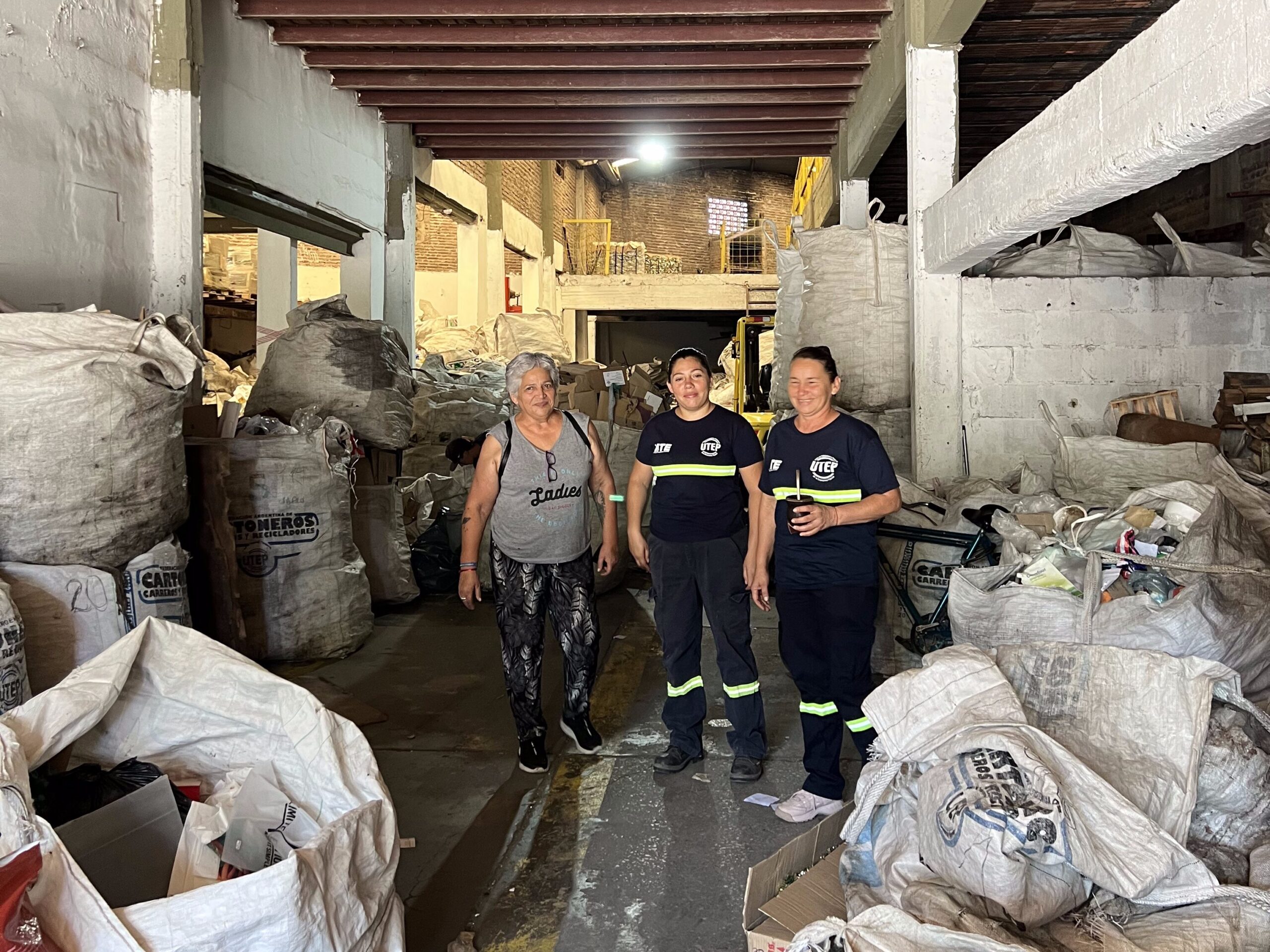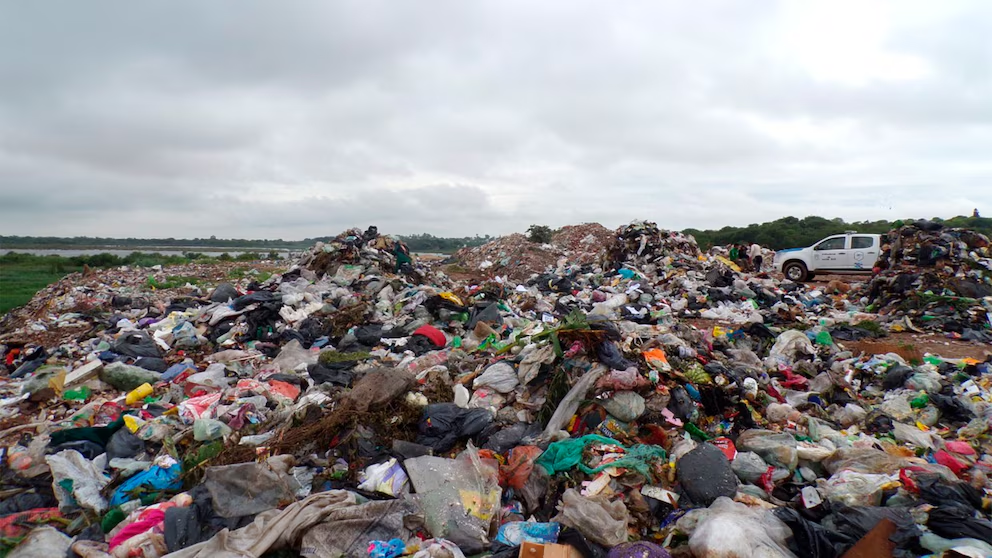In Argentina, 45,000 tons of waste are generated daily, of which nearly 25% ends up in open dumps—direct sources of methane gas emissions. The Milei administration has recently authorized the importation of waste materials, exacerbating social and environmental harms.
On Thursday, July 24, the Inter-American Commission on Human Rights (IACHR) held a regional hearing on methane emissions reduction and the situation of waste pickers in Latin America and the Caribbean.
During her intervention at the hearing, Giselle Munno Dithurbide, Legal Officer at FARN, explained that the current economic model —based on a production logic that demands high levels of consumption— is one of the main causes of the collapse of the waste management system.
In Argentina, an average of 1.15 kg of waste is generated per person per day, according to a 2023 report by the Ministry of Environment and Sustainable Development, . Around 25% of this waste ends up in more than 5,000 open dumps across the country, posing serious environmental, health, and climate threats.
«From a production standpoint, and in order to reduce the amount of materials discarded and entering the waste management system, it is essential for States in the region to support and promote the Global Plastics Treaty, a legal tool to protect human health and the environment from pollution,» Munno Dithurbide stated.
She also warned that open dumps «are a direct source of methane gas emissions, which negatively impact the climate and human health.» Methane is a precursor to tropospheric ozone, associated with one million premature deaths per year due to respiratory diseases, and is the most significant greenhouse gas in the waste sector. In Argentina, methane emissions from this sector are almost equivalent to those from the energy sector and accounted for more than 17% of total methane emissions in 2022, according to the National Inventory Report of the First Biennial Transparency Report to the UN Framework Convention on Climate Change.
Additionally, open dumps generate leachate: contaminated liquids resulting from waste decomposition. Without proper environmental and sanitary controls, as in sanitary landfills, these liquids can seep into soil and contaminate both groundwater and surface water, posing concrete health risks such as respiratory diseases, poisoning, skin infections, neurological issues, birth defects, and low birth weight, among others. However, “our country currently lacks a clear policy or comprehensive air quality monitoring system,” Munno Dithurbide pointed out.
On March 21, FARN submitted a public information request regarding methane and tropospheric ozone levels in Argentina. The response from the Subsecretariat of Environment stated it does not hold primary responsibility in the matter, though it mentioned that ozone monitoring is limited to a few cities: Buenos Aires (CABA), Bahía Blanca, Zárate, and Campana in the Buenos Aires Province.
The Ministry of Health responded that it does not hold responsibility for air quality monitoring and redirected the inquiry back to the Subsecretariat of Environment, despite Law 20.284 on air quality establishing that enforcement and oversight fall under the responsibility of health authorities.
“This institutional fragmentation reflects a structural lack of protection that directly affects public health, especially for those living or working near waste disposal sites,” Munno Dithurbide emphasized.
Urban Waste Collectors and Recyclers
In this context, at the beginning of this year, Decree 1/25 was issued, authorizing the import of waste as input for other production processes. This measure had a direct and negative impact on local waste pickers by devaluing the price of domestic recyclable materials, reducing the income of cooperatives and recycling workers. It also discouraged internal recycling, especially harming those who already face enormous barriers to accessing formal employment.
The decree also increased the amount of discarded materials that are not reintegrated into the local market, worsening the environmental impact of a waste management system that, as Munno Dithurbide noted, is already overwhelmed.
This is compounded by the national-level paralysis and under-execution of key programs such as «Argentina Recicla» and the IDB Loan 5567/OC-AR, as well as the gutting of environmental agencies responsible for both the federal waste management system and the remediation of open dumps.
Furthermore, the Buenos Aires City Government, led by Jorge Macri, announced last Wednesday that it will stop covering the daily transportation of waste pickers who travel from the Province to the City of Buenos Aires to carry out their work.
This decision is particularly alarming considering that the City generates 7,500 tons of waste per day—an average of 2.5 kg per inhabitant—according to data from the Ministry of Public Space and Urban Hygiene, more than a kilo above the national average.
“Waste pickers are the ones who sustain a large part of the urban waste management system and must be recognized as human rights defenders in environmental matters, in accordance with Article 9 of the Escazú Agreement, and their full enjoyment and exercise of their rights must be guaranteed,” Munno Dithurbide stressed.

“To address this problem, it is also essential to focus on production. It is unacceptable that, to date, there is no regulation requiring companies to take responsibility for the waste generated by the products they put on the market, which end up negatively affecting our bodies and territories,” she added. In Argentina, there are four packaging law proposals with parliamentary status, all of which incorporate Extended Producer Responsibility (EPR).
In this regard, FARN urged the IACHR to promote inter-American standards for waste management with a human rights approach; to encourage States to include mitigation commitments targeting the waste sector; to reaffirm the need to protect waste pickers, recognizing their central role in waste management systems; to raise alerts about policies that prioritize the free market over environmental protection, public health, and the income and labor rights of waste pickers; and to foster the allocation and strict execution of budgetary resources aimed at the Integrated Urban Solid Waste Management System and the eradication of open dumps.
